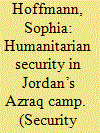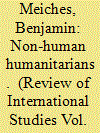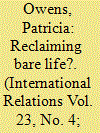|
|
|
Sort Order |
|
|
|
Items / Page
|
|
|
|
|
|
|
| Srl | Item |
| 1 |
ID:
152404


|
|
|
|
|
| Summary/Abstract |
Azraq, a new camp for Syrian refugees in the Jordanian desert, presents an unprecedented integration of humanitarian service delivery and harsh security measures. I argue that Azraq’s ‘innovative’ order can only be explained in reference to three security claims that international refugee aid answers to: the claim to secure Syrian refugees, the claim to secure the Jordanian state and the claim to secure aid workers. Implementing these claims entails contradictory practices, which should create dilemmas for humanitarian aid, yet in Azraq these practices merge with each other. This merging (or integration) is aided by the humanitarian sector’s eager embrace of hi-tech solutions, especially digital data management. The article contributes to the growing debate about how security is articulated in the humanitarian arena by placing this debate’s key findings into conversation within a richly researched study of Azraq’s ‘material assemblage’ (Hilhorst and Jansen, 2010; Meiches, 2015). Further, the article emphasizes the importance of the under-researched area of aid organizations’ own security management.
|
|
|
|
|
|
|
|
|
|
|
|
|
|
|
|
| 2 |
ID:
164433


|
|
|
|
|
| Summary/Abstract |
The study of humanitarian intervention typically focuses on the human victims and saviours in armed conflict and natural disasters. Moreover, explanations of the virtues of humanitarian norms and ethics emphasise the importance of the university of suffering and the empathic nature of humanitarian efforts. In contrast, this article explores the neglected world of ‘non-human humanitarians’. Specifically, the article outlines three cases of non-human actors that expand and complicate international humanitarian practices: dogs, drones, and diagrams. Drawing on new materialist and posthuman literatures, the article argues that non-humans possess distinct capacities that vastly expand and transform humanitarian efforts in ranging from relief, to medicine, to conflict resolution. Highlighting non-human humanitarians thus offers a new perspective on the resources available for redressing mass violence and conflict, but also complicates existing definitions of humanitarian norms. To the contrary, the article demonstrates that non-humans often maximise humanitarian services to a degree greater than their human counterparts, but have also introduced changes into humanitarian practices that have problematic unintended consequences. Non-human humanitarians reveals previously discounted participants in international politics and the key roles they play in various international interventions.
|
|
|
|
|
|
|
|
|
|
|
|
|
|
|
|
| 3 |
ID:
141463


|
|
|
|
|
| Summary/Abstract |
Critical scholarship on the camp tends to focus on the institution’s historical role in producing forms of social exclusion often by linking the emergence of the camp to the creation of abstract political divisions such as citizenship and nationality. While this approach has unquestionable value, it overemphasizes the importance of social constructions in the history and development of the camp. This article calls for a re-examination of the material elements composing camp spaces by offering attention to how non-human entities and processes contribute to the development of practices of confinement, security and governance. Drawing on the work of Manuel DeLanda, Gilles Deleuze, and Félix Guattari, this article develops an outline of the camp as a material assemblage and examines how the camp emerges from the interaction of barbed wire, war, and the rise of motorized transport. This process of historical emergence helps to explain the elastic and transient dimensions of the camp as constitutive of a new form of fluid political control. Moreover, the article claims that attending to the materiality of the camp helps to explain the expanding role that camps will play in the future of political governance.
|
|
|
|
|
|
|
|
|
|
|
|
|
|
|
|
| 4 |
ID:
141782


|
|
|
|
|
| Summary/Abstract |
Critical scholarship on the camp tends to focus on the institution’s historical role in producing forms of social exclusion often by linking the emergence of the camp to the creation of abstract political divisions such as citizenship and nationality. While this approach has unquestionable value, it overemphasizes the importance of social constructions in the history and development of the camp. This article calls for a re-examination of the material elements composing camp spaces by offering attention to how non-human entities and processes contribute to the development of practices of confinement, security and governance. Drawing on the work of Manuel DeLanda, Gilles Deleuze, and Félix Guattari, this article develops an outline of the camp as a material assemblage and examines how the camp emerges from the interaction of barbed wire, war, and the rise of motorized transport. This process of historical emergence helps to explain the elastic and transient dimensions of the camp as constitutive of a new form of fluid political control. Moreover, the article claims that attending to the materiality of the camp helps to explain the expanding role that camps will play in the future of political governance.
|
|
|
|
|
|
|
|
|
|
|
|
|
|
|
|
| 5 |
ID:
093674


|
|
|
|
|
| Publication |
2009.
|
| Summary/Abstract |
Giorgio Agamben claims that refugees can be seen as the ultimate 'biopolitical' subjects: those who can be regulated and governed at the level of population in a permanent 'state of exception'. Refugees are reduced to 'bare life': humans as animals in nature without political freedom. Contra Agamben, it will be argued here that if refugee populations are not to face some inexorable trend toward a rule of 'exception', then it will not be through reclaiming 'bare life'. It will be wholly dependent on the ability to forge a public realm grounded on the appropriate distinction between nature and political artifice, between human life and the political world. This argument is made through contrasting Agamben's writing on refugees with Hannah Arendt's. What is at stake in the difference is illustrated through the example of refugee lip-sewing.
|
|
|
|
|
|
|
|
|
|
|
|
|
|
|
|
|
|
|
|
|